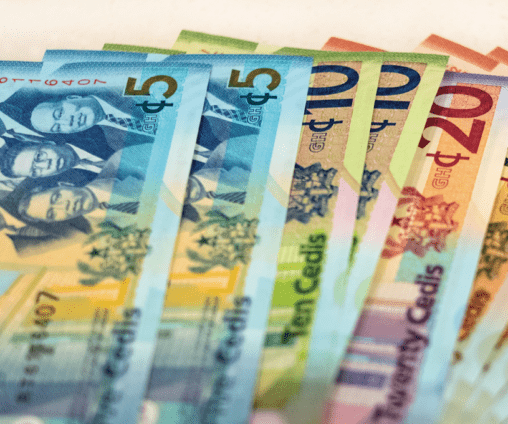By Joshua Worlasi AMLANU & Ebenezer Chike Adjei Njoku
The cedi (GH¢) experienced a decline against major trading currencies last week as foreign exchange (FX) liquidity remained tight in view of high demand, according to recent investor updates from Databank and Constant Capital.
The local currency’s depreciation has been attributed to a mix of factors, including subdued FX liquidity, government coupon payment and continued uncertainties in the market following COCOBOD’s decision regarding the annual cocoa loan syndication.
Last week, the cedi depreciated by 0.31 percent against the US dollar (USD), 1.82 percent against the British pound (GBP), and 3.76 percent against the euro (EUR) on the retail market. The currency ended the trading week at a mid-rate of 15.98 to the dollar.
“The cedi’s recent depreciation was largely driven by limited FX liquidity,” Databank noted in its update.
Additionally, COCOBOD’s decision not to raise its annual cocoa syndication loan renewed concerns about the cedi’s short-term stability.
Recent coupon payments under the Domestic Debt Exchange Programme (DDEP) also played a role in influencing the cedi’s performance. Government disbursed GH¢7.52billion in coupon payments on August 20, 2024 – marking the third consecutive disbursement since introducing new bonds under the DDEP. Of the total amount, GH¢4.28billion was paid in cash while GH¢3.24billion was issued as coupons-in-kind (PIK), involving the issuance of additional bonds. This payment injected significant liquidity into the market, contributing to increased demand for foreign exchange.
Databank suggested that this demand may have further pressured the cedi, leading to its depreciation.
Meanwhile, the cedi showed a mixed performance in different segments of the market. Constant Capital reported that while the cedi held steady against the dollar in the wholesale market – opening and closing at GH¢15.13/USD, it declined by 2.16 percent and 1.57 percent against the British pound and euro respectively. The currency traded at GH¢19.97 per pound and GH¢16.91 per euro by end of the week.
In the spot market, the cedi was trading at GH¢15.75/USD at the week’s close. Constant Capital’s report highlighted that there was “relatively heavy activity” from both onshore and offshore participants throughout the week, with corporate demand remaining elevated despite substantial supply volumes.
Government is set to commence a 10-day Eurobond debt exchange this week as part of its efforts to conclude a US$13billion Eurobond debt restructuring. This exchange will allow investors to swap their existing bonds for two new options: DISCO and PAR. The DISCO option offers investors a 37% haircut, with two new bonds maturing in July 2029 and 2035 at an interest rate of 5%. The PAR option, on the other hand, provides an interest rate of 1.5% on new bonds maturing in January 2037, without any haircut.
Databank expressed optimism that a successful debt exchange could remove some strain from the cedi by reducing market uncertainties. However, they also cautioned that the local currency may continue facing downward pressure in the short-term due to ongoing subdued FX liquidity.
Analysts expect market uncertainties to improve after completion of the Eurobond exchange, which could provide some relief to the cedi.
“We expect market uncertainties to improve after a successful exchange,” Databank stated, suggesting that this could reduce strain on the cedi. However, until then the currency’s outlook remains uncertain; particularly given the current liquidity challenges and government’s evolving debt management strategies.










